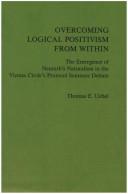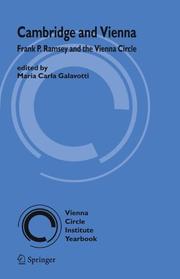| Listing 1 - 10 of 46 | << page >> |
Sort by
|
Book
ISBN: 9783709111277 3709111277 Year: 2012 Publisher: Wien New York, NY : Springer,
Abstract | Keywords | Export | Availability | Bookmark
 Loading...
Loading...Choose an application
- Reference Manager
- EndNote
- RefWorks (Direct export to RefWorks)
Book
ISBN: 9783643506726 Year: 2015 Publisher: Wien : LIT,
Abstract | Keywords | Export | Availability | Bookmark
 Loading...
Loading...Choose an application
- Reference Manager
- EndNote
- RefWorks (Direct export to RefWorks)
Book
ISBN: 9780521624756 9780511815157 9780521624480 Year: 2000 Publisher: Cambridge Cambridge University Press
Abstract | Keywords | Export | Availability | Bookmark
 Loading...
Loading...Choose an application
- Reference Manager
- EndNote
- RefWorks (Direct export to RefWorks)
"Carl Gustav Hempel (1905-1997) was one of the preeminent figures in the philosophical movement of logical empiricism. He was a member of both the Berlin and Vienna Circles, fled Germany in 1934, and finally settled in the United States, where he taught for forty-five years in New York, New Haven, Princeton, and Pittsburgh." "The essays in this collection come from the early and late periods of Hempel's career and chart his intellectual odyssey from a commitment to rigorous logical positivism in the 1930s (when Hempel allied himself closely with Carnap) to a more sociological approach that was close in spirit to the work of Neurath and Kuhn."--Jacket.
Empiricism. --- Empirisme. --- Philosophie. --- Philosophy. --- Taalfilosofie. --- Wiener Kreis.
Book
Year: 1987 Publisher: [S.l. : chez l'auteur],
Abstract | Keywords | Export | Availability | Bookmark
 Loading...
Loading...Choose an application
- Reference Manager
- EndNote
- RefWorks (Direct export to RefWorks)
Book
ISBN: 9782940427451 2940427453 Year: 2021 Publisher: Genève: Markus Haller,
Abstract | Keywords | Export | Availability | Bookmark
 Loading...
Loading...Choose an application
- Reference Manager
- EndNote
- RefWorks (Direct export to RefWorks)
Après la Première Guerre mondiale, quelques-uns des esprits les plus brillants se sont réunis à Vienne pour examiner les idées fondamentales des mathématiques, de la philosophie et de la physique depuis l'Antiquité. Inspirés par la théorie de la relativité d'Albert Einstein, et des recherches de Bertrand Russell sur les fondements des mathématiques, ces jeunes chercheurs avaient l'ambition de formuler une conception scientifique du monde qui renonce au jargon obscur de la philosophie traditionnelle. Ils ont appelé leur groupe le Cercle de Vienne. Les membres fondateurs du Cercle – le philosophe Moritz Schlick, l'économiste Otto Neurath et le mathématicien Hans Hahn – se sont donné pour tâche de créer une philosophie entièrement dépourvue de métaphysique. D'autres chercheurs extraordinaires, comme le mathématicien Kurt Gödel, se sont bientôt joints à leurs discussions régulières. Le Tractatus logico-philosophicus de Ludwig Wittgenstein est devenu une source d'inspiration puissante. Au fil des années, les écrits des membres du Cercle ont entièrement transformé la manière traditionnelle de comprendre le monde. Leur influence reste importante jusqu'à aujourd'hui. Mais la Vienne de l'entre-deux-guerres a aussi donné lieu à des passions politiques. Le fascisme a finalement mis un terme aux recherches de ces penseurs qui se sont engagés sans exception pour les valeurs progressistes. Schlick a été assassiné, les autres ont dû s'exiler. Ce livre raconte leur histoire intellectuelle et personnelle.
Philosophie et sciences. --- Wiener Kreis. --- Science and philosophy --- Vienna circle
Book
ISBN: 9783709101766 370910176X Year: 2011 Publisher: Wien : Springer,
Abstract | Keywords | Export | Availability | Bookmark
 Loading...
Loading...Choose an application
- Reference Manager
- EndNote
- RefWorks (Direct export to RefWorks)
Vienna circle. --- Logical positivism. --- Philosophy and science --- Institut Wiener Kreis.
Book
ISBN: 9783499505089 Year: 2015 Publisher: Reinbek bei Hamburg : Rowohlt,
Abstract | Keywords | Export | Availability | Bookmark
 Loading...
Loading...Choose an application
- Reference Manager
- EndNote
- RefWorks (Direct export to RefWorks)
Philosophy, Austrian --- Philosophy, Austrian. --- Vienna circle. --- Wiener Kreis. --- 1900-1999.

ISBN: 905183442X 9004458190 Year: 1992 Publisher: Amsterdam Rodopi
Abstract | Keywords | Export | Availability | Bookmark
 Loading...
Loading...Choose an application
- Reference Manager
- EndNote
- RefWorks (Direct export to RefWorks)
Logical positivism --- Naturalism --- Neurath, Otto, --- Institut Wiener Kreis.

ISBN: 9789004458192 9789051834420 Year: 1992 Publisher: Leiden;Boston BRILL
Abstract | Keywords | Export | Availability | Bookmark
 Loading...
Loading...Choose an application
- Reference Manager
- EndNote
- RefWorks (Direct export to RefWorks)
Logical positivism --- Naturalism --- Neurath, Otto, --- Institut Wiener Kreis.

ISBN: 1402041004 9781402041006 9048170427 9786610624782 1280624787 1402041012 Year: 2006 Publisher: Dordrecht Springer
Abstract | Keywords | Export | Availability | Bookmark
 Loading...
Loading...Choose an application
- Reference Manager
- EndNote
- RefWorks (Direct export to RefWorks)
The Institute Vienna Circle held a conference in Vienna in 2003, Cambridge and Vienna – Frank P. Ramsey and the Vienna Circle, to commemorate the philosophical and scientific work of Frank Plumpton Ramsey (1903–1930). This Ramsey conference provided not only historical and biographical perspectives on one of the most gifted thinkers of the Twentieth Century, but also new impulses for further research on at least some of the topics pioneered by Ramsey, whose interest and potential are greater than ever. Ramsey did pioneering work in several fields, practitioners of which rarely know of his important work in other fields: philosophy of logic and theory of language, foundations of mathematics, mathematics, probability theory, methodology of science, philosophy of psychology, and economics. There was a focus on the one topic which was of strongest mutual concern to Ramsey and the Vienna Circle, namely the question of foundations of mathematics, in particular the status of logicism. Although the major scientific connection linking Ramsey with Austria is his work on logic, to which the Vienna Circle dedicated several meetings, certainly the connection which is of greater general interest concerns Ramsey's visits and discussions with Wittgenstein. Ramsey was the only important thinker to actually visit Wittgenstein during his school-teaching career in Puchberg and Ottertal in the 1920s, in Lower Austria; and later, Ramsey was instrumental in getting Wittgenstein positions at Cambridge.
Vienna circle --- Ramsey, Frank Plumpton, --- Viennese circle --- Wiener Kreis --- Ramsey, F. P. --- Philosophers --- Logical positivism
| Listing 1 - 10 of 46 | << page >> |
Sort by
|

 Search
Search Feedback
Feedback About UniCat
About UniCat  Help
Help News
News